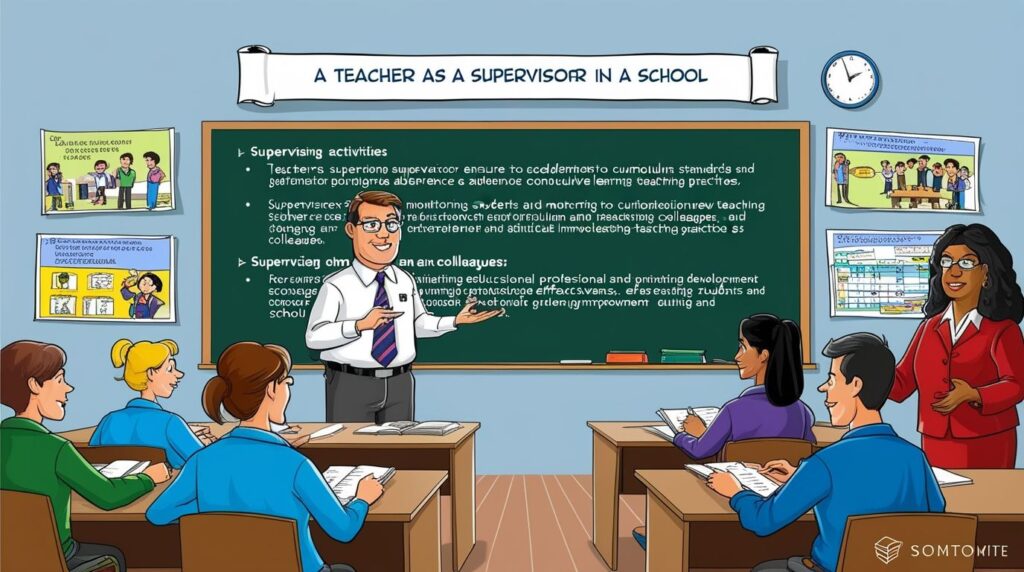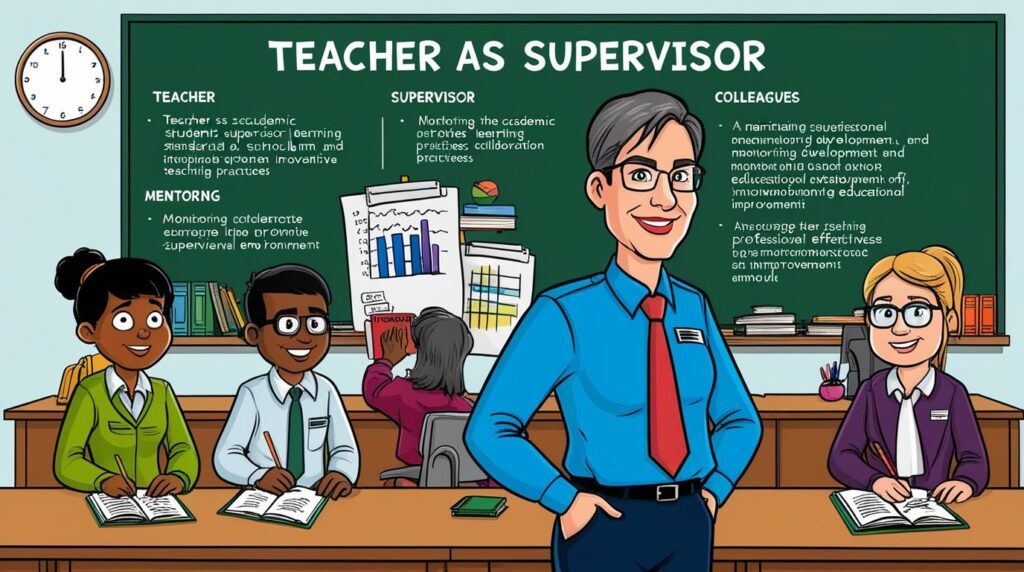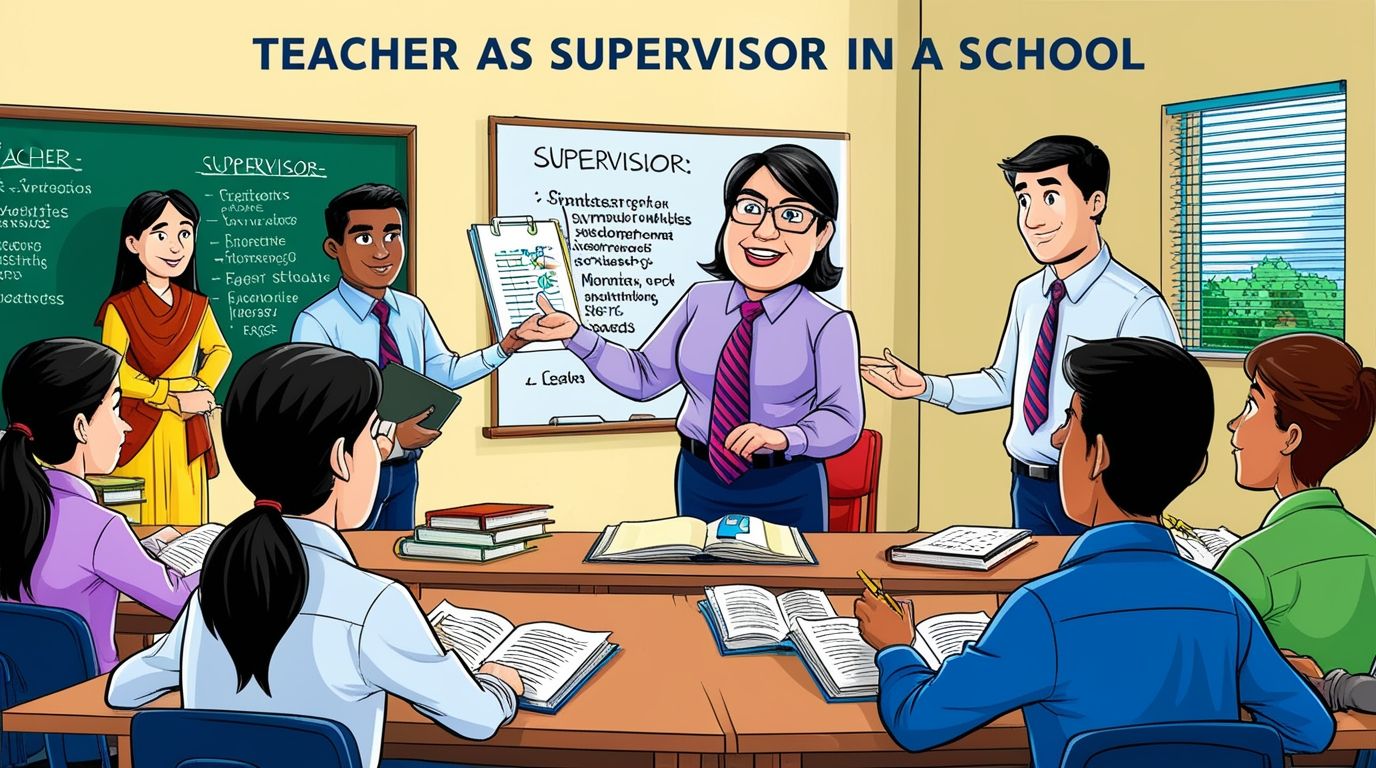Teacher as Supervisor in a School, In the dynamic environment of education, the role of a teacher transcends beyond mere instruction. Teachers not only impart knowledge but also serve as supervisors who guide, manage, and oversee various facets of the educational process. This dual role of a teacher as a supervisor ensures the holistic development of students, fosters a productive learning environment, and maintains the overall efficiency of the school system. Understanding the significance of this role sheds light on its multifaceted responsibilities, challenges, and impact on education.
Defining the Supervisory Role of a Teacher
Supervision in a school context refers to the continuous process of guiding and monitoring students’ academic, behavioral, and emotional growth. While teachers are primarily tasked with delivering lessons, their supervisory responsibilities involve overseeing the day-to-day activities within the classroom and beyond. This includes ensuring adherence to school policies, promoting a safe and inclusive learning atmosphere, and encouraging students to reach their full potential.
The role of a teacher as a supervisor bridges the gap between administrative directives and student experiences. It encompasses managing classroom dynamics, coordinating with colleagues and parents, and mentoring students. The effectiveness of this role often determines the quality of education and the overall performance of the school.
Key Supervisory Responsibilities of Teachers
1. Classroom Management
One of the primary supervisory duties of a teacher is managing the classroom effectively. This includes:
- Maintaining Discipline: Teachers ensure that students adhere to classroom rules and maintain a respectful environment. Discipline fosters a structured setting where learning can thrive.
- Creating a Conducive Environment: Supervisors are responsible for creating a positive and supportive classroom atmosphere. This involves arranging the physical layout of the room, setting clear expectations, and addressing disruptions promptly.
2. Monitoring Academic Progress
Teachers as supervisors keep a close eye on the academic performance of their students. They achieve this by:
- Evaluating Student Work: Regular assessment of assignments, projects, and tests provides insights into each student’s progress.
- Providing Feedback: Constructive feedback helps students identify their strengths and areas for improvement, motivating them to achieve better results.
- Identifying Learning Gaps: Supervisors detect students who may be struggling and implement strategies to address these issues, such as personalized instruction or remedial sessions.

3. Guiding and Counseling Students
Supervisory teachers often act as mentors and counselors. They support students not just academically but also emotionally and socially. This involves:
- Providing Career Guidance: Teachers help students explore career paths and make informed decisions about their futures.
- Addressing Behavioral Issues: Supervisors identify and resolve behavioral challenges by working closely with the students and, when necessary, involving parents or specialists.
- Encouraging Personal Growth: Supervisors play a vital role in fostering qualities like resilience, empathy, and responsibility in their students.
4. Supervising Extracurricular Activities
The supervisory role extends beyond the classroom into extracurricular domains. Teachers oversee clubs, sports teams, and events, ensuring these activities align with the school’s educational objectives. This supervision cultivates teamwork, leadership, and creativity among students.
5. Ensuring Safety and Well-being
A teacher as a supervisor ensures the safety and well-being of students by:
- Monitoring Behavior: Observing students during recess, lunch, and transitions between classes helps prevent accidents and misconduct.
- Addressing Bullying: Supervisors identify and address bullying, creating a safe and inclusive environment for all.
- Maintaining Health Protocols: Teachers ensure that students adhere to health and hygiene practices, particularly during times of public health concerns.
Qualities of an Effective Supervisory Teacher
To excel as supervisors, teachers must possess a range of qualities that enable them to manage their responsibilities effectively:
- Leadership Skills: Supervisory teachers must inspire and guide students, leading by example and fostering respect.
- Empathy and Understanding: A compassionate approach helps in addressing students’ individual needs and challenges.
- Strong Communication: Effective supervision requires clear communication with students, parents, and colleagues.
- Adaptability: Supervisors must be flexible in handling diverse situations, from academic challenges to behavioral issues.
- Organizational Abilities: Keeping track of students’ progress, managing classroom activities, and coordinating with the school administration require strong organizational skills.
Challenges Faced by Supervisory Teachers
Despite their pivotal role, teachers as supervisors encounter several challenges:
- Balancing Teaching and Supervision: Teachers often struggle to balance the demands of teaching with their supervisory responsibilities. The dual role can be overwhelming, especially in large classrooms.
- Addressing Diverse Needs: Managing a diverse group of students with varying learning styles, abilities, and behaviors requires significant effort and creativity.
- Dealing with Behavioral Issues: Supervisors frequently face difficulties in addressing persistent behavioral problems, which can disrupt the learning process.
- Time Constraints: Limited time for planning, supervision, and administrative tasks often hampers the efficiency of teachers in their supervisory roles.
Strategies for Effective Supervision
To overcome these challenges and excel in their supervisory duties, teachers can adopt several strategies:
- Professional Development: Continuous training and workshops help teachers develop the skills necessary for effective supervision. Topics such as conflict resolution, classroom management, and counseling techniques can be particularly beneficial.
- Technology Integration: Utilizing digital tools and platforms can streamline supervisory tasks. For instance, educational software can assist in tracking student performance and managing classroom activities.
- Collaboration: Working closely with colleagues, parents, and administrators fosters a supportive network that enhances supervisory effectiveness.
- Encouraging Student Responsibility: Empowering students to take ownership of their learning and behavior reduces the burden on teachers and promotes a collaborative environment.
- Regular Reflection: Supervisors can benefit from self-assessment and feedback, identifying areas for improvement in their approach.

Impact of Effective Teacher Supervision
The supervisory role of teachers has far-reaching impacts on the school community:
- Student Development: Effective supervision ensures that students receive the guidance and support they need to excel academically and personally.
- Improved Discipline: A well-supervised classroom promotes discipline, reducing disruptions and enhancing the overall learning experience.
- Enhanced School Reputation: Teachers who excel in their supervisory roles contribute to the school’s reputation as a center of excellence.
- Stronger Parent-Teacher Collaboration: Supervisors who engage effectively with parents build trust and foster a sense of partnership in their children’s education.
Conclusion
The role of a teacher as a supervisor is integral to the success of the educational process. By overseeing classroom management, monitoring academic progress, guiding students, and ensuring their well-being, teachers shape not only the academic but also the personal growth of their students. Despite the challenges involved, adopting effective strategies and leveraging support systems enables teachers to excel in their supervisory roles. Ultimately, a teacher’s ability to supervise effectively enhances the quality of education, fostering a nurturing environment where students can thrive and reach their full potential.

3 thoughts on “Teacher as Supervisor in a School”
Comments are closed.